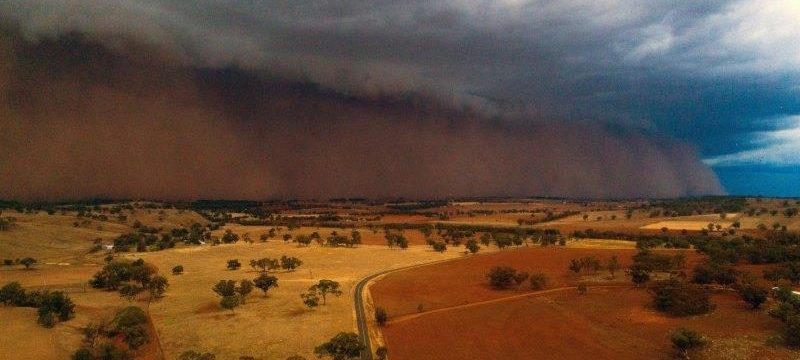There is no good news for the world in the most sophisticated and exhaustive report on climate change ever undertaken, the product of millions of hours of work by thousands of scientists and hundreds of contributing and lead authors.
Before its release, representatives of the 195 countries that make up the United Nations’ Intergovernmental Panel on Climate Change haggled over the wording of the crucial 40-page summary of its so-called Sixth Assessment Report line-by-line for two weeks.
A dust storm near Orange, NSW, in January. There is no good news for the world in the most sophisticated and exhaustive report on climate change ever undertaken.Credit:Nick Moir
Despite that exhaustive process, attended as it was by some with an interest in softening its blows, and despite its poised and clinical language, the document still plots a course to global catastrophe.
Observed increases in greenhouse gasses are “unequivocally caused by human activities” it begins. Each of the past four decades has been warmer than those that preceded it.
All that has changed since the last assessment was published seven years ago is that greenhouse gas concentrations have increased while the tools available to the scientists to chart and predict their impact have improved.
Under the most optimistic of five scenarios charted in the summary (should world governments that have, so far, failed to reduce greenhouse gas emissions despite a global pandemic somehow set a course to massive greenhouse gas reductions in the coming decade and should they then develop and deploy new technologies to strip carbon dioxide from the air and store it underground) the world will still likely exceed 1.5 degrees of warming before 2040.
Human fingerprints can be seen in the floods, fires and heatwaves now battering the northern hemisphere. Even before today that grim milestone has been passed, one of the report’s lead authors, the CSIRO’s Pep Canadell, told Australian journalists hours before the full report was released.
Should this best possible outcome be achieved, should we skip over 1.5 by just a degree and then stabilise the climate and slowly see it start to cool, this is the sort of weather that will mark the world for the rest of the century.
In southern Australia, this means longer and more frequent droughts and fire seasons. Along our east coast, it means more of the marine heatwaves like those that have so far killed half the corals of the Great Barrier Reef.
The report details sudden and catastrophic changes that are not likely in the coming century but cannot be ruled out. These include sudden global deforestation and the collapse of ice sheets driving water levels up by 15 metres.
It notes that sea levels have already risen worldwide faster since 1900 than at any time over the past 3000 years and that even in a stabilised climate these changes will continue for thousands of years.
But Canadell also says that exceeding the more ambitious 1.5-degree goal arrived at during talks in Paris does not represent some sort of cliff fall. Climate change is incremental and any tenth of a degree shaved off future warming is a significant victory.
Equally, any further delay in action increases the likelihood of dire outcomes as more carbon dioxide accumulates in the atmosphere, and makes the work of cutting emissions adequately even more difficult.
The implicit message for Australia is grim in political and trade terms, too.
By any reading, the report makes clear that the world can either take appropriate action on climate change or it can countenance the continued use of fossil fuels, particularly coal and gas.
It can’t do both.
The Morning Edition newsletter is our guide to the day’s most important and interesting stories, analysis and insights. Sign up here.
Most Viewed in Environment
From our partners
Source: Read Full Article

